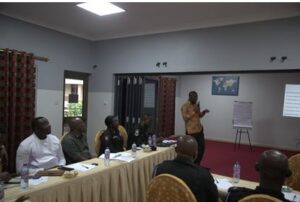By Juliet Aguiar DUGBARTEY, Takoradi
The Environmental Justice Foundation (EJF) is urging authorities to step up enforcement and ensure effective prosecution of Illegal, Unreported and Unregulated (IUU) fishing activities in Ghana.
According to the organisation, successful prosecution of offenders will serve as a deterrent and help curb the increasing use of destructive and unlawful fishing methods.
Speaking at a multi-agency workshop held in Takoradi, Mr. Osei-Akoto Nyantakyi, Programmes Officer at the EJF, emphasised that Ghana’s fish stocks are declining at an alarming rate. He attributed this to a combination of climate change and persistent use of harmful fishing practices such as light fishing, dynamite, carbide and toxic chemicals.
The workshop brought together participants from the Ghana Navy, Marine Police Unit, Office of the Attorney-General and Monitoring, Control and Surveillance (MCS) Division of the Fisheries Commission. The forum aimed to identify gaps in the enforcement chain, propose legal and operational reforms and foster better coordination among stakeholders.

Mr. Nyantakyi underscored the urgent need for stricter enforcement of existing fisheries laws and more decisive legal outcomes to deter IUU fishing. He highlighted that weak enforcement and inadequate capacity across the prosecutorial chain are undermining efforts to protect marine resources.
Participants noted that Ghana’s fisheries enforcement infrastructure is under-resourced, with limited personnel and equipment. The country is currently divided into only two marine enforcement zones – Eastern and Western – leaving significant gaps in coverage. It was recommended that additional Fisheries Enforcement Units be established in the Central and Volta Regions to improve operational responsiveness.
Concerns were also raised over current legal provisions that allow certain fisheries offences, despite being criminal in nature, to be settled out of court. Stakeholders called for a review of these frameworks, with a view to closing loopholes and strengthening prosecutorial consistency.
The workshop concluded with a call for regular, targetted training programmes to build long-term capacity among enforcement officers, legal practitioners and other stakeholders involved in the fisheries sector.










